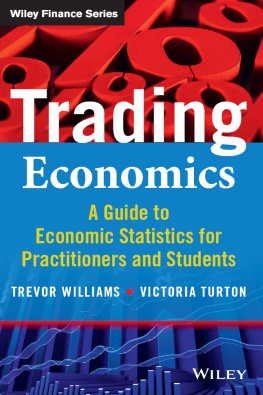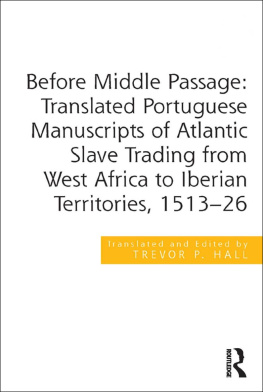Williams Trevor - Trading Economics
Here you can read online Williams Trevor - Trading Economics full text of the book (entire story) in english for free. Download pdf and epub, get meaning, cover and reviews about this ebook. year: 2014, genre: Politics. Description of the work, (preface) as well as reviews are available. Best literature library LitArk.com created for fans of good reading and offers a wide selection of genres:
Romance novel
Science fiction
Adventure
Detective
Science
History
Home and family
Prose
Art
Politics
Computer
Non-fiction
Religion
Business
Children
Humor
Choose a favorite category and find really read worthwhile books. Enjoy immersion in the world of imagination, feel the emotions of the characters or learn something new for yourself, make an fascinating discovery.
- Book:Trading Economics
- Author:
- Genre:
- Year:2014
- Rating:4 / 5
- Favourites:Add to favourites
- Your mark:
- 80
- 1
- 2
- 3
- 4
- 5
Trading Economics: summary, description and annotation
We offer to read an annotation, description, summary or preface (depends on what the author of the book "Trading Economics" wrote himself). If you haven't found the necessary information about the book — write in the comments, we will try to find it.
Trading Economics — read online for free the complete book (whole text) full work
Below is the text of the book, divided by pages. System saving the place of the last page read, allows you to conveniently read the book "Trading Economics" online for free, without having to search again every time where you left off. Put a bookmark, and you can go to the page where you finished reading at any time.
Font size:
Interval:
Bookmark:

For other titles in the Wiley Finance series
please see www.wiley.com/finance
for Practitioners and Students
Trevor Williams
Victoria Turton

This edition first published 2014
2014 Trevor Williams and Victoria Turton
Registered office
John Wiley & Sons Ltd, The Atrium, Southern Gate, Chichester, West Sussex, PO19 8SQ, United Kingdom
For details of our global editorial offices, for customer services and for information about how to apply for permission to reuse the copyright material in this book please see our website at www.wiley.com.
All rights reserved. No part of this publication may be reproduced, stored in a retrieval system, or transmitted, in any form or by any means, electronic, mechanical, photocopying, recording or otherwise, except as permitted by the UK Copyright, Designs and Patents Act 1988, without the prior permission of the publisher.
Wiley publishes in a variety of print and electronic formats and by print-on-demand. Some material included with standard print versions of this book may not be included in e-books or in print-on-demand. If this book refers to media such as a CD or DVD that is not included in the version you purchased, you may download this material at http://booksupport.wiley.com. For more information about Wiley products, visit www.wiley.com.
Designations used by companies to distinguish their products are often claimed as trademarks. All brand names and product names used in this book are trade names, service marks, trademarks or registered trademarks of their respective owners. The publisher is not associated with any product or vendor mentioned in this book.
Limit of Liability/Disclaimer of Warranty: While the publisher and author have used their best efforts in preparing this book, they make no representations or warranties with the respect to the accuracy or completeness of the contents of this book and specifically disclaim any implied warranties of merchantability or fitness for a particular purpose. It is sold on the understanding that the publisher is not engaged in rendering professional services and neither the publisher nor the author shall be liable for damages arising herefrom. If professional advice or other expert assistance is required, the services of a competent professional should be sought.
Library of Congress Cataloging-in-Publication Data
Williams, Trevor, 1957
Trading economics : a guide to economic statistics for practitioners & students / Trevor Williams, Victoria Turton.1
pages cm.(The Wiley finance series)
Includes bibliographical references and index.
ISBN 978-1-118-76641-5 (hardback)ISBN 978-1-118-76631-6 (ebk) ISBN 978-1-118-76638-5 (ebk)ISBN 978-1-118-76629-3 (ebk) 1. FinanceStatistics. 2. Money marketHandbooks, manuals, etc. I. Turton, Victoria, 1974 II. Title.
HG176.5.W55 2014
330.015195dc23
2014007150
A catalogue record for this book is available from the British Library.
ISBN 978-1-118-76641-5 (hardback) ISBN 978-1-118-76631-6 (ebk)
ISBN 978-1-118-76638-5 (ebk) ISBN 978-1-118-76629-3 (ebk)
Cover image: Shutterstock.com
Thank you to all of the people involved in writing and producing Trading Economics. Special thanks must go to friends and family. Without your enduring support, this journey would have been far more difficult.
June 2013
Today's interconnected world, linked by freer trade, by some of the greatest movements of people through tourism and immigration the world has ever seen, by the movement of goods and services all underpinned by new methods of open communication that were unimaginable a generation or so ago and involving more countries than ever before means that an understanding of economics matters more than ever. It is no surprise, therefore, that headlines scream economic news, newspapers are full of stories based on statistics about economic performance within and amongst countries, government officials are constantly discussing the economy and there are pundits, radio and TV shows, some broadcasting 24 hours a day, with experts claiming to know all sorts of things based on economic data. Then there are all the blogs, tweets and internet media channels to add to the mixture. With the cacophony of noise from these media, it is increasingly hard to discern the underlying economic trends from what are often conflicting data.
What has allowed today's world to come into being is a belief that more trade is better than less trade, that producing goods and services where it is cheapest to do so allows for a rise in living standards for all concerned (though not all to the same extent). This outcome is based on one of the fundamental elements of economic rationale the division of labour and comparative trade advantage. What is economics about, if not the production of goods and services to satisfy human wants and needs? It is the acceptance of this notion across many societies around the world that has given rise to the explosive increase in global wealth that has taken place in the last 50 years and that we see all around us.
This is why an understanding of economic statistics and what they mean is crucial. These statistics are the basis for individual, corporate and collective or societal decision-making. Governments use economic statistics to plan spending and policy; companies use them to decide when and where to produce goods and services; investors (including pension funds, insurance companies, individuals etc.) use them to decide where to put their wealth; and households use them to decide when to buy or sell goods and services.
These data drive trends in the financial markets. Without the constant drip feed of economic news, markets tend to drift. What they await what they in fact need is the next piece of new information to jolt them into action. The experience of recent years has taught us that financial markets do not inhabit a separate realm, detached from the real economy. Far from it financial markets are fundamentally tethered to the real economy. They have an impact on us all. That is why they matter and why understanding the data that drives the financial markets will support traders and practitioners in reading the markets more comprehensively and framing their own reactions accordingly.
A surprise index, as its name suggests, measures the extent to which economic indicators are better or worse than expectations in other words, they surprise interested observers, the markets.
Economic surprise indices illustrate just how important economic indicators are to financial markets, affecting the decision-making process of the millions of participants whose buying and selling decisions ultimately make them up.
Surprise indices are therefore a cumulative measure of figures released pertaining to the economy that are appreciably different from the average predicted by those who are forecasting them. If the results continue to be better than expected, the index will rise. Of course, if they are worse than expected then it will fall. You would expect positive surprises to be positively correlated with asset price change, including equity prices.
This is partly about the psychology of price movements in asset markets. If the momentum is linked to a feelgood factor about a trend and the data support it, by coming in better than expected, then optimism is boosted. Sentiment is key to the movements of financial markets, and shifts in asset prices are often linked not just to the absolute outcome of economic and other data that are being released, but also to whether they are better or worse than people (i.e. investors) thought they would be.
Next pageFont size:
Interval:
Bookmark:
Similar books «Trading Economics»
Look at similar books to Trading Economics. We have selected literature similar in name and meaning in the hope of providing readers with more options to find new, interesting, not yet read works.
Discussion, reviews of the book Trading Economics and just readers' own opinions. Leave your comments, write what you think about the work, its meaning or the main characters. Specify what exactly you liked and what you didn't like, and why you think so.












